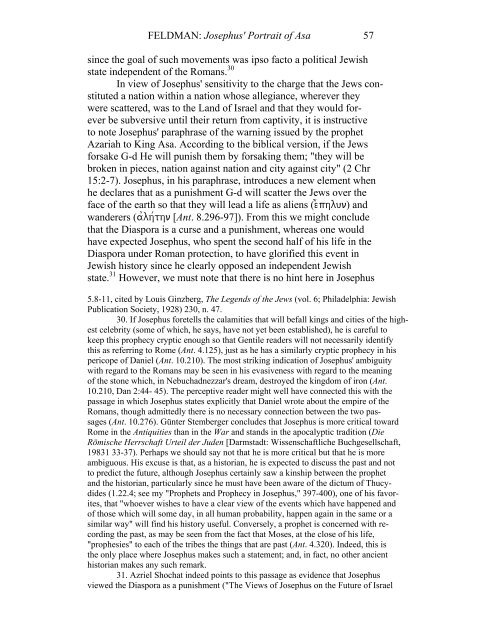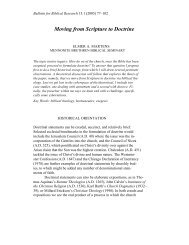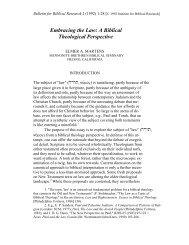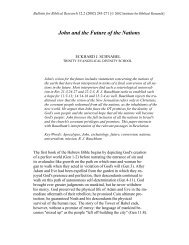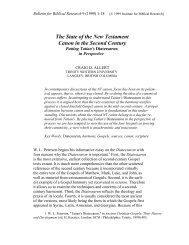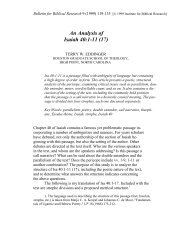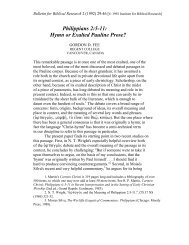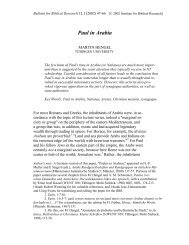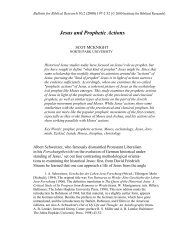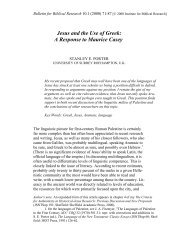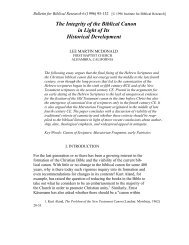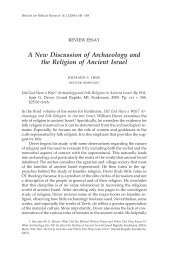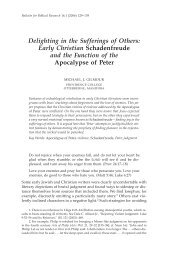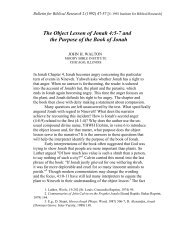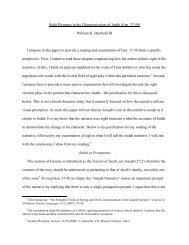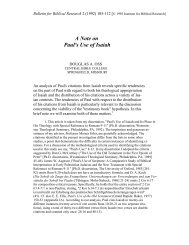Josephus' Portrait of Asa - Institute for Biblical Research
Josephus' Portrait of Asa - Institute for Biblical Research
Josephus' Portrait of Asa - Institute for Biblical Research
Create successful ePaper yourself
Turn your PDF publications into a flip-book with our unique Google optimized e-Paper software.
FELDMAN: <strong>Josephus'</strong> <strong>Portrait</strong> <strong>of</strong> <strong>Asa</strong> 57<br />
since the goal <strong>of</strong> such movements was ipso facto a political Jewish<br />
state independent <strong>of</strong> the Romans. 30<br />
In view <strong>of</strong> <strong>Josephus'</strong> sensitivity to the charge that the Jews constituted<br />
a nation within a nation whose allegiance, wherever they<br />
were scattered, was to the Land <strong>of</strong> Israel and that they would <strong>for</strong>ever<br />
be subversive until their return from captivity, it is instructive<br />
to note <strong>Josephus'</strong> paraphrase <strong>of</strong> the warning issued by the prophet<br />
Azariah to King <strong>Asa</strong>. According to the biblical version, if the Jews<br />
<strong>for</strong>sake G-d He will punish them by <strong>for</strong>saking them; "they will be<br />
broken in pieces, nation against nation and city against city" (2 Chr<br />
15:2-7). Josephus, in his paraphrase, introduces a new element when<br />
he declares that as a punishment G-d will scatter the Jews over the<br />
face <strong>of</strong> the earth so that they will lead a life as aliens (e!phlun) and<br />
wanderers (a0lh/thn [Ant. 8.296-97]). From this we might conclude<br />
that the Diaspora is a curse and a punishment, whereas one would<br />
have expected Josephus, who spent the second half <strong>of</strong> his life in the<br />
Diaspora under Roman protection, to have glorified this event in<br />
Jewish history since he clearly opposed an independent Jewish<br />
state. 31 However, we must note that there is no hint here in Josephus<br />
5.8-11, cited by Louis Ginzberg, The Legends <strong>of</strong> the Jews (vol. 6; Philadelphia: Jewish<br />
Publication Society, 1928) 230, n. 47.<br />
30. If Josephus <strong>for</strong>etells the calamities that will befall kings and cities <strong>of</strong> the highest<br />
celebrity (some <strong>of</strong> which, he says, have not yet been established), he is careful to<br />
keep this prophecy cryptic enough so that Gentile readers will not necessarily identify<br />
this as referring to Rome (Ant. 4.125), just as he has a similarly cryptic prophecy in his<br />
pericope <strong>of</strong> Daniel (Ant. 10.210). The most striking indication <strong>of</strong> <strong>Josephus'</strong> ambiguity<br />
with regard to the Romans may be seen in his evasiveness with regard to the meaning<br />
<strong>of</strong> the stone which, in Nebuchadnezzar's dream, destroyed the kingdom <strong>of</strong> iron (Ant.<br />
10.210, Dan 2:44- 45). The perceptive reader might well have connected this with the<br />
passage in which Josephus states explicitly that Daniel wrote about the empire <strong>of</strong> the<br />
Romans, though admittedly there is no necessary connection between the two passages<br />
(Ant. 10.276). Günter Stemberger concludes that Josephus is more critical toward<br />
Rome in the Antiquities than in the War and stands in the apocalyptic tradition (Die<br />
Römische Herrschaft Urteil der Juden [Darmstadt: Wissenschaftliche Buchgesellschaft,<br />
19831 33-37). Perhaps we should say not that he is more critical but that he is more<br />
ambiguous. His excuse is that, as a historian, he is expected to discuss the past and not<br />
to predict the future, although Josephus certainly saw a kinship between the prophet<br />
and the historian, particularly since he must have been aware <strong>of</strong> the dictum <strong>of</strong> Thucydides<br />
(1.22.4; see my "Prophets and Prophecy in Josephus," 397-400), one <strong>of</strong> his favorites,<br />
that "whoever wishes to have a clear view <strong>of</strong> the events which have happened and<br />
<strong>of</strong> those which will some day, in all human probability, happen again in the same or a<br />
similar way" will find his history useful. Conversely, a prophet is concerned with recording<br />
the past, as may be seen from the fact that Moses, at the close <strong>of</strong> his life,<br />
"prophesies" to each <strong>of</strong> the tribes the things that are past (Ant. 4.320). Indeed, this is<br />
the only place where Josephus makes such a statement; and, in fact, no other ancient<br />
historian makes any such remark.<br />
31. Azriel Shochat indeed points to this passage as evidence that Josephus<br />
viewed the Diaspora as a punishment ("The Views <strong>of</strong> Josephus on the Future <strong>of</strong> Israel


